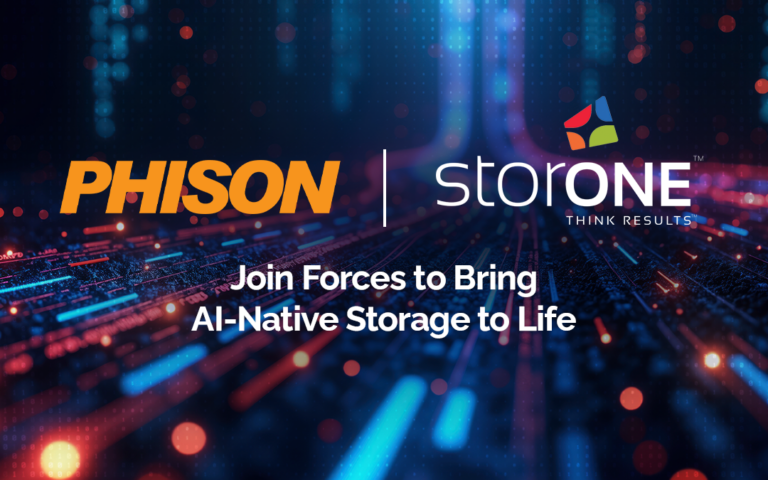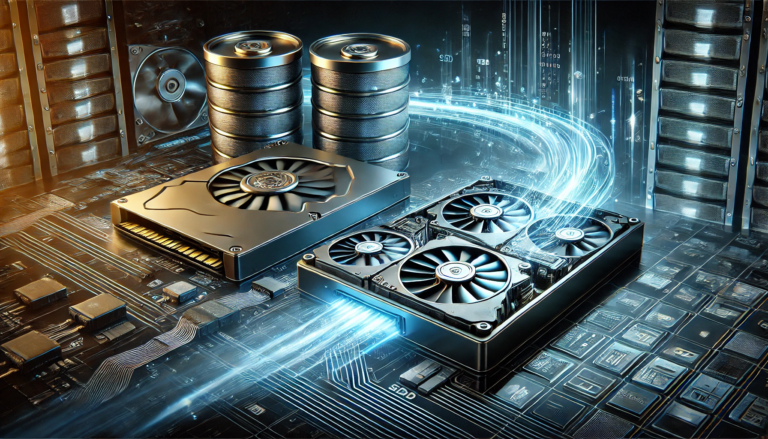By Chris Mellon, StorONE Solution Architect
AI in the Spotlight: AI has emerged as a pivotal technology, with daily updates on its transformative potential for businesses. While cloud-based AI solutions are widely discussed, concerns about data privacy and security push many organizations towards on-prem solutions.
Open-Source AI Models: The landscape of AI includes various open-source models. Nvidia’s recent release of NVLM 1.0, a family of large multimodal language models, exemplifies this trend. Instead of competing directly with existing AI models, Nvidia is making the model and model weights available, encouraging the development of custom AI applications.
Storage Considerations for On-Prem AI: Deploying AI on-prem involves choosing the right storage platform. According to DGIC, storage vendors often tout “AI-powered storage,” which might include features like:
- Identifying and alerting to faulty or failing hardware components on the system.
- Anomaly detection for Ransomware protection.
- Algorithms to support efficient data movement or tiering of data between storage layers (SSD, HDD, or QLC)
More importantly is the term “Storage for AI.” Storage for AI specifically refers to storage systems optimized for hosting AI workloads. In that same DGIC article it listed several characteristics that are useful in a storage platform that can be leveraged for AI Training and inference. These include:
- High write throughput. Nimbus has found that most typical enterprise workloads tend to have a read bias. In the case of AI, it has found AI workloads to possess a heavy bias toward writes. This requires storage for AI to accommodate high write throughputs with low latency.
- Scalable. AI requires high amounts of data to operate necessitating that storage for AI scale to high storage capacity levels. This may equate to storage systems needing to scale to petabytes of capacity to handle AI workloads.
- Power-efficient. The larger in capacity that a storage system scales, the more power it may consume. Organizations should therefore account for a storage system’s power efficiency before selecting a solution. Otherwise, a storage system that consumes a lot of power will also contribute to escalating operational costs.
- Support for block and/or NFS storage protocols. To achieve the highest throughput, storage for AI must support block and/or NFS storage networking protocols.
- Little or no need for traditional storage system data management services. Features such as clones, compression, and deduplication as “largely irrelevant” in AI environments.
One of the things that is not mentioned is the new value of the data that powers these AI insights and the need to protect it from loss, theft, ransomware, and deletion. The data that is mined for new insights is typically unstructured data that in many cases may not be protected as much as say a corporations OLTP database. A platform for on-prem AI needs features that will aid in that protection.
With these factors in mind here are areas where StorONE’s revolutionary storage platform could be a cost-effective solution for your in-house AI environment.
General Recommendations for StorONE with AI Workflows:
- Hybrid Storage Utilization:
- Dynamic Data
Tiering: Utilize StorONE’s capability to automatically move data between SSD tiers and HDD tiers based on access patterns. For AI, this means frequently accessed training data or models should reside on the SSD tier or on a dedicated SSD volume for performance, while less frequently accessed data (like older training sets or archived models) can be on hybrid volumes based on SSDs and HDDs. Utilizing hybrid volumes allows you to have the performance of flash for writing the data into the volume and the cost effectiveness of hard drives for longer term retention without worrying about the data movement itself as that is managed by StorONE’s optimized data placement algorithm.
- Dynamic Data
- Protocol Flexibility:
- StorONE supports multiple protocols (block, file, object). For AI workflows:
- Object Storage: Use for raw data ingestion or model versioning where scalability and cost-effectiveness are key.
- File Storage: Ideal for preprocessing stages where data might need to be accessed in traditional file formats.
- Block Storage: For high-performance needs during training, especially if using GPUs directly.
- Scalability:
- Given AI’s need for scalability, StorONE’s virtual storage containers can be particularly useful. They allow for seamless scaling without data migration hassles, which is crucial for growing datasets or expanding model sizes.
- In a StorONE platform you can utilize its Virtual Storage container capability to provide Block, File or Object volumes on the same system. Pick the protocol that makes the most sense for your workload while providing data and performance isolation without stranding underlying hardware resources in separate siloed systems.
- Data Protection and Availability:
- Leverage StorONE’s snapshot technology for quick rollbacks or data recovery, which is vital during model experimentation or when dealing with data integrity issues. In addition, StorONE’s ability to support a virtually unlimited number of snapshots, which have no negative performance impact, can provide data protection against ransomware, and data deletion. The snapshot schedules can be set up in a grandfather, father, son pattern allowing for great granularity in the snapshot schedule. All StorONE systems utilize SED drives, as a standard, reducing the chances of data theft.
- Replication complements your data protection by allowing you to keep a copy of your data in a separate location. StorONE supports synchronous, asynchronous, and semi-synchronous replication to multiple systems. In addition, the snapshot schedules can be different on either side of the replicas, allowing you to provide long term retention at your DR site on less expensive and lower performing media such as all HDD volumes if desired. This can dramatically reduce costs to store the replica copy of the data without affecting the performance of the primary replica. In addition, with the support of our snapshot’s you can mount a snapshot on the passive side of the replication and do reporting or analysis of the data on the passive side.
- StorONE enhanced Security features provide foundational protection mechanisms for your data. StorONE has multiple security features built in such as:
- Multi-Admin approval is required to do actions such as volume deletion, snap deletion, snap schedule modification and more.
- Multifactor authentication means only authorized users have the ability to administrate the system.
- A volume recycle bin protects data against accidental deletion.
- Anomaly detection and robust alerting give you notification of unusual activity on volumes, including deletion, or encryption from ransomware.
- Multifactor authentication means only authorized users have the ability to administrate the system.
- Multi-Admin approval is required to do actions such as volume deletion, snap deletion, snap schedule modification and more.
Specific AI Workflow Integration:
- Data Ingestion and Preprocessing:
- Use file or object storage for initial data ingestion due to its scalability. StorONE’s hybrid (SSD/HDD) or two-tier (write optimized/ read optimized flash) volumes give you the flexibility and simplicity of storing and using your data from the same volume, reducing the need to move the data in and out of the system.
- Model Training:
- Active Training Data: Keep in SSD volumes for the best performance. StorONE’s ability to handle multiple protocols means you can efficiently manage this data whether it is in file format or object storage.
- Model Artifacts: Store intermediate and final models on two-tier flash or hybrid volumes for quick retrieval during evaluation or deployment phases.
- Retraining and Inference:
- Data Selection for Retraining: Utilize StorONE’s data tiering to ensure that data selected for retraining is quickly accessible.
- Inference: If real-time inference requires accessing large datasets, ensure these are on SSD or two-tier flash volumes. StorONE’s flexibility allows for efficient management of such data.
- Cost Management:
- StorONE’s hybrid approach allows for cost optimization by dynamically adjusting where data resides. For AI, this means you can scale up SSD usage during intensive training periods and scale back for cost savings during less intensive phases. StorONE’s virtual storage containers ensure that as your needs change, you do not strand underlying storage resources, they can be reconfigured on the fly to meet changing requirements.
- StorONE’s hybrid approach allows for cost optimization by dynamically adjusting where data resides. For AI, this means you can scale up SSD usage during intensive training periods and scale back for cost savings during less intensive phases. StorONE’s virtual storage containers ensure that as your needs change, you do not strand underlying storage resources, they can be reconfigured on the fly to meet changing requirements.
Additional Considerations:
- Monitoring and Optimization: Continuously monitor data access patterns through StorONE’s analytics to optimize where data should be stored for AI workflows.
- Futureproofing: Given StorONE’s design to adapt to future technologies, your AI storage infrastructure can evolve with new storage media or AI-specific hardware advancements without major overhauls.
- Security: Ensure that sensitive data or models are protected using StorONE’s security features, which could be crucial for proprietary AI models or datasets.
By leveraging StorONE’s capabilities, you can create a highly efficient, scalable, and cost-effective storage environment tailored to the dynamic needs of AI training and retraining, ensuring performance where it matters most while optimizing for cost across the board. StorONE enhanced Security features provide foundational protection mechanisms for your data, built in security features protect your valuable corporate assets and intellectual property.




